India mixed locations
Almora
Bimbhetka
Bhopal
Bod Gaya
Bhuntar
Chandigar
Chaukori
Dwarahat
Ellora
Goa
Gokarna
Jaipur
Jaisalmer
Mahabalipuram
Manali/Bunthar
Mumbai
Munnar
Mysore
Orcha
Parvati valley
Sanchi
Spiti
Varanasi/Benares
Vengurla
Spiti
Varanasi
Savety
Health
Climate
to top
India A - B- C
By locations
Goa Trishuli Spiti
Bimbhetka
Bhopal
Bod Gaya
Bhuntar
Chandigar
Chaukori
Dwarahat
Ellora
Goa
Gokarna
Jaipur
Jaisalmer
Mahabalipuram
Manali/Bunthar
Mumbai
Munnar
Mysore
Orcha
Parvati valley
Sanchi
Spiti
Varanasi/Benares
Vengurla
Spiti
Varanasi
Savety
Health
Climate
to top
India A - B- C
By locations
Goa Trishuli Spiti
India Mixed Locations
Almora - Bimbhetka - Bhopal - Bod Gaya - Bhuntar - Chandigar - Chaukori - Dwarahat - Ellora - Goa - Gokarna- Jaipur - Jaisalmer - Mahabalipuram - Manali/Bunthar - Mumbai - Munnar - Mysore - Orcha - Parvati valley - Sanchi - Spiti - Varanasi/Benares - Vengurla (A- v)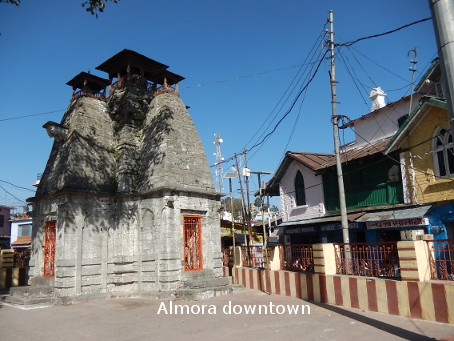 Almora:
Almora: The city and hillstation at 1 600 m, with 2 km of Bazar with temples at both ends and in center, a diversity of shops and hidden streets, nice houses and archaeological sites. The city is district capitel and has also a university. It is starting point for trekks in the Trishul region and the border region to China-Tibet, or across to Kailash Mansarowar.
The region is mostly interesting by its history and first settling volks, some places not far from Almora give proove of that like Dwarahat or Baijnath, the last can be reached through the Kosi valley via Kausani, 2,5 hrs by shartaxi or bus.
Its surrounding streams and hills are of enchanting beauty and some offer the chance to watch the Tawny eagle and vultures. Kosi valley is magic and striking by its beauty, between Almora in south and Kausani in the north. You can do nice hikes and trekks and maybe a swim not far from the porcupine quills in the close hills, revisited apr.017, gallery.
Bimbhetka:
world heritage monument, rock shelters with cave paintings which date back the
oldest ones 15 000 years, differing by color in black, white and red, showing animals, hunters and symbols. Some one or two hours by bus from Bhopal.
Bhopal:
The capitel of Madya Pradesh, a huge city spread around the hills of central north India, set around 2 big lakes, with the old town, new city, university campuses, parks and lakesides. It is the city with Asias bigest Jama Masjid, at the times not as busy as the one in Delhi.
Had a very good shave there, with head massage afterwards.
Bodh Gaya:
The place where Buddha got enlightened. I was there during the Dalai Lamas teaching over the milleniums change 99/00, a very intense and impressing time, the teachings got translated into many languages and people could follow by listening to walky talkies, we all sat under a huge bamboo tent, chai/ tea got served and the techings and ceremonies were very special.
At that time during winters (from millenium change) many exile Tibetans, coming fom all over India, travelled there for the ceremonies, meetings and teachings given by the Dalai Lamas teachings. Bodh Gaya itself a small village with the temple complex, hostels and hotels and the water tank and park close. Mahabodhi temple gets circumambulated clockwise during special hours of the day by many Buddhists and pilgrims, nearby is a water tank with the Buddha statue in the center waterlilies and fish, a good place to rest.
There are many guest houses for the different nationalities from around the world to house the pilgrims, visitors, Buddhists and tourists. I stayed at the Burmese vihar one of bigger the wellknown places with rooms and dorms. A very good friend from that time, and buddhist monk form east Germany, put up his shag on one of the balconies of it, we had a great time during there over teh millenium change. Mahabodhi Temple
Bunthar:
find with Manali below
Chandigarh:
A huge city (VIC) set about 8 hrs by car north of Delhi, a quite untypical indian city with big streets, cycle and pedestrian zones, squares and roundabouts, got planned and built in the 60s. Hot and organised like somewhere between Monza and Marseille, many of its parts along streets have yet much space for building. It has one of the biggest bus terminals in total India if not Asia at all, busses can be counted for proof, the station is organised, but busy with food stalls, restaurants which serve best indian traditional foods, samosas, cofee and all what people on way can imagine.
Numbers of platforms are also impressing, heading to Dharamsala, HP, and further you need to take the busses from New bus stand, which is just 20 min away by new modern city busses.
In the city you find Picadilly, shops and Birdpark, some main modern looking squares and I had once a laptop repaired there, whih did not get checked for solidity as some busses before the ride, Punjabi drivers preempt bus testing can look impressing.
The city got planned by a french architect whose name i cannot spell, but overall the city is defenitly worth a visit either, along ways some soldiers can be seen playing featherball inside military compounds, which leaves a peacefull impression, Birdpark got only seen on a sign, and that is good enough, there are many out there free ! In reach by car or bus are big cities like Ambala and Saharanpur (- VIC -) within 4 hrs under normal conditons.
Chaukori:
on my way for Trekking at Mount Trishul i stayed some days at Chaukori, met a nice big indian family there, had breakfast togather and i found a wonderful old Tea-estate, kind of farmhouse with great view on the Nandas (Shivaliks all over 5000m)
Dwarahat:
A beautifull nice med sized village in the dry enchanting hills between Kausani, Raniketh Almora in Uttarkhand. It has astonishing well maintained Temples in good shape between more younger houses around. One of its temples is the court which is impressing some 10 min from center up. The main temple named Gurj Devi is done with attractive and very inspiring temple figures, not too big but a bid reminding to Kajuraho, hot sharp and sexy dating back to 12 th century. But not set in djunglelike habitat as Kajuraho far more south. Dwarahat is at 1600m alt and streets are winding up there passing pine woods and Leopard country. You can find flowers like Agaves, Opuntia cacti, Ipomea, Hemp, Bananas, Grapes, Citrus fruits etc
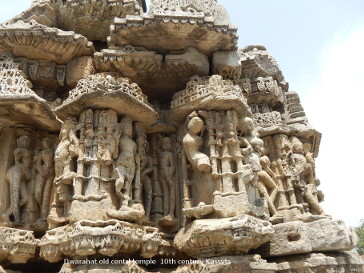
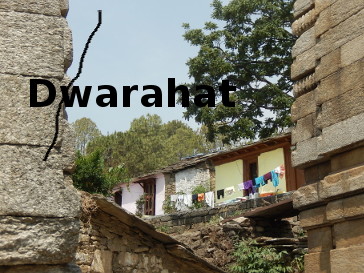
Ellora:
A World heritage monument, Worlds biggest Monolithe, the famouse caves not far from the city Aurangabad some 350 hundred kilometers northeast of Mumbay, huge temple caves carved out of the mountain, fantastic structures, some are of hindu less of buddhist origin. Cave Nr 32- 34 are also interesting, also worlds biggest Monolithe is there. Ellora bird infos and gallery
Goa:
Nice mixed infos on Goa and from earlier times action and parties (p.unpolitical)
Gokarna:
A big quite interesting village set along the coast south of Goa. It has an interesting mix of old houses and temples, partly renovated, a water tank a bid hidden off the villages center, some small shops and restaurants and is the main hub to Om beach, Kutli, Half Moon, Paradise and Gokarna beach itself, some surfers there. About 15min to Om and Kutli beach by car or rikshaw from the village. Gokarna can be reached from Panjim (Goa capital) via Ankola by bus (3hrs) or by train from Margao to Karwar (1hrs) or Margao to Gokarna road by local train, or from far south Ernakulam-Cochin by train (8-11hrs)
Jaipur:
also called "the Pink City" after the many blue painted houses, the capital of Rajasthan and one of the worlds main places for cutting and trading gems.
Jaisalmer:
very interesting medium sized city in the desert of Rajasthan and border region to Pakistan, with huge fort on top of a hill, there palace stile fency guest houses, narrow shade spending roads, nice painted desert houses in periphery of the city, wonderful water tank with palace stile small towers
Mahabalipuram:
Worldheritage monument, the five pagodas, placed some 2 or 3 hours bus drive south of Chennai (former Madras) in Tamil Nadu. Mahabalipuram became quite a big and crowded village over the last 15 years. In the rock hills, smooth granite rocks you find caves, temples and carvings all worth a visit and little bid further south of the village you find the famouse five pagodas, of which it is saied thet they are prototypes of Indian temple stile in southern India.
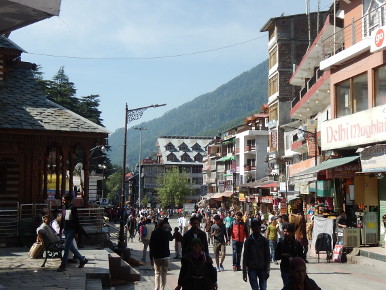 Manali - Bunthar:
Manali - Bunthar: the best of locations for honey moon, groovie movie, hikes and drives, swims in Beas river are chilling and bath not allowed, take care, Beas is good for rafting, take security with full helmet and life jacket. Meet a Kali for modern laundring or fun in the sun. Some beaches like as Kalga beach in Parvati valley are not too big but nothing can happen if want to take sun near that beach of a stretch. Got revisited o17 and its of enchanting with breathtaking views, alt at 1700m.
Bunthar is on way from Mandi to Manali (-VIC-), a nice small town along the Beas. From there you get into the Parvaty valley, it has also an aerport. During season buses leave at evenings the way to Delhi and Chandigar.
It has a small nice marcet and bazar, on other side crossing the suspension bridge for pedestrians you can find narrow roads and nice gardens with privae houses. As the town has an aerport in soem hotels service tax needs t be paied, which changed o17, as some newspapers told, now you do not need to pay it any more. Fruits get sold along Kullu valley main street like apricoats, cherries and others during warm season, deliciouse.
Once arriving midnight with matadji in Bunthars dark streets, after a long ride in gov. bus, coming from Chandigar on way from Rishikesh, both of us very tired but still fit, it was nice next day to enter Parvati valley and having breakfast in Kasol. Between Bunthar and Manali you find the district capitel Kullu, a spread around and busy town with marcet, bus stand and more, not so famouse as Manali or Bunthar.

View north the way to Spiti over Rothang la from Manali
Mumbai :
The huge well known metropoli along Indias westcoast. Big streets, busses, cars trucks and all what you can imagine streets can take, also Dabba wallas on cycles. The long Marine drive and pear to relax in the brise along the sea, not far from banking, stocks, headquarters, hotels and more. In downtown two main train stations, taking a few milion poeple every day, Chatrapatty Shivaji and Central station (once Victoria and Churchgate), but many more. To aerport calculate about 1 hrs depending on daytime and traffic, which can be heavy.
It has many different quarters of diverse charcter and even a National park with Leopards, the worlds only nat. park in a metropoly alike. Many meet at India gate and surrounding areas which are nice for walks also, In center are huge maidans, open fields where they play cricket during people rest in shade aside. Sugarcane juice is strongly recomend in that city climate, also for Goa which is about 9 hrs south by train or bus. A huge megacity and not unfriendly, interesting and not dangerouse, here and there by traffic, bargaining is part of business as usual, the city is an adventure nicely calculated and its diversity and many faces inviting. Got visited many times,
also infos at Megacities VIC
Munnar:
A busy small touristic town set in the Nilgiris at 1600m surrounded with partly djungle covered hills but mostly tea plantations. Mid of december is peak flowering season, so short before peak tourist time over xmas and newyear myriads of flowers, also lemongrass on some hills, are blossoming. Munnar has big hotels of the uppar category, many shops for getting spices,also local coffe, variouse sorts of tea from local tea plantations, also chocolate in many shops and Eukalyptus oil. In Munnar you can book tours for trekking or to national parks of the region like Eravikulam (Nilgiri Thar) and tourist spot trips like to djungle flower garden, Madupetty dam, Tea museum (20min by foot) and Top slip, also old Munnar should be worth a visit. Madupetty lake (30min by car, bus from Munnar) is great, set in tea hills and partly with secondary djungle, I saw a Muntjac, Flameback, big colorful Woodpecker and more in variouse moods and great changes of color and light. From Munnar you can do nice walks in the hills around. The hillcity of the Nilgiris can be reached from Thekkady in Kerala by buses or jeep in roughly 2 hours or from Tamil Nadu side either Madurai or a closer town in about 4-6 hrs on partly high up winding hillsnake road in tea hills (dec 015).
gallery VIC
Mysore:
A medium sized city in southwest Karnataka, once the seat of Tipu Sultan, hated by the British during colonial times. Well organized with streets in squares, a very nice big vegetable and fruit marcet, big Post office, and all kind of shops from small to big and modern, also selling digital equipment. Mysore has a well organized big bus stand with small retstaurants and food selling shops. Mysore can be reached from Bangalore (2hrs by car, bus; Bangaluru) or from Kalpetta in Kerala, approx. 6hrs by car, bus, partly steep winding road through Bandipur Nat. park (Tigers) on Karnataka side gallery VIC
Orcha: nice village sat in middle of a nice river, little touritstic with fantastic huge old temples and an old Maharaj Palace (wall paintings, fortified gate ...)
Parvati valley: infos in german or english
Sanchi:
world heritage monument, a special place of architecture and worship of buddhist origin. Set on a small hill, specially formed and carved Stupas with partly big gates, also carved, on the hill, The Stupas in all sizes from small to big, also Buddhas in stone near the ruins of the monastary with water tank not far, all on top of the hill, good for nice walks. To be found somewhere out there in the heat some 10 hrs by train northeast of Mumbay the way to Bhopal not too far (1-2 hrs), Madya pradesh.
Spiti:
is a border region to China allready on the Tibetan plateau, you can reach Spiti from Manali in the Kulu valley via Rothang La (Rothang pass 3955 m) and Kunzom La, or from Shimla and Rekong Peo/Kalpa in the south of Spiti. The capital of Spite is Kaza (Kaja) a small town with a partly Tibetan market.
Before I got to Spiti I did stayed some days in Keylong, a nice village at the slopes of the Himalayes allready in the rain shadow, where i met a Lama who took me with him in his Jeep to Spiti the name of the place is Rangrik, also named Munselling by locals, some kilometers before Kaza from the north. A nice small village with a high school area, dormitories for the kids, exercise place and the more. Hree the valley is some little kilometers wide, I did nice walks over the fields, found prayer stones, of which some I took back to room. I enjoyed the days in the vast valley, in the rocks along the river.
During that days I discovered a small fish. In Rangarik (also Munselling), a small village with new school area with primary and high school, auditorium max, dormitories and a golden Buddha statue in back on a hilltop. I got the best room there by nice Lama Tashi who also took me to Ke Gompa where we had a meal with the Lamas.
Ke Gompa (also Ki or Key g.) where the Lama took me for a visit, a very interesting and impressing place set on top of a hill, where we had food togather with the Lamas, -very special. Spiti lays in the rain shadow so it s very deserted of plants and vegitation but the colours and rock formationes are very special, only along the river you find some green areas with interesting botanik (orchids, Akelei etc flowering in june). infos also here, Spiti map,
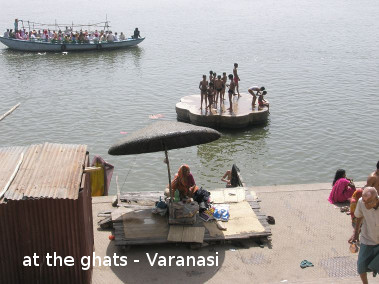 Varanasi /Benares:
Varanasi /Benares: The great and famouse holy city along the holy river Ganges, it is one of the oldest cities on earth permanently populated for some 3000 years, along the river you can walk the Ghats (the stairways down to the river), each with an own name painted on the old walls. On two ghats the dead get burned, where it s not allowed to make pictures, i was never interested to do so. Other ghats are for doing Puja as the main ghats, others are washing places and for praying, some for the laundry drying some with buffaloes, some ghats for the small boats, all togather a very impressing picture and nice for walking days long. Indide from the ghats you find the old town with narrow streets, marcets and shops, for gems, incense, parfume, jewels, souvenirs, spicies, food etc the further you move inside the more it gets modern and also very busy, all is moving on the streets.
Boat trips can be done on river Ganga, I did over days as part of my dolphine watching, exercises and taking over to other side, which is much less busy, see gallery. Good boat rowing, partly also with friends. One time 4 of us during midnight. Dolphins can be seen depending on actual water pollution, before 2o1o it was quite common to see them, guess it is changing over weeks and season. It is Irawadi dolphins, so to say dolphine watching from the city, unique. gallery
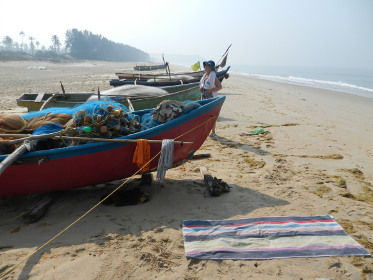 Vengurla:
Vengurla: north of Goa, about 2 hrs by scooter from Goan northern territories (Laguna), is the beautifull big village Vengurla, set at the enchanting sea with big waves, take a rest in shade of the fisher boats, a evening walk along the harbour region and hills can be proof special in case the whitebellied does his moves around there with a snake catch, interesting houses with my good friends, who are some of them specialised in snake antipoisen.
Savety:
India is in general a save country in respect to your physical health, nobody will touch you, it is also called "state of mind", but it can be that women are a special attraction to some men and they will get touched if not dressed properely. Be aware of your belongings in trains, thiefs are a problem on some routes so between Delhi and Varanasi, and Delhi and Agra, chain your luggage to the train with a padlock. Agra is a problem city by itself and maybe the only one, i got some stories by the news about people who got poisened there.
Locals do good bargaining and have a good taset of whom is newcomer, greenhorn or Gringo and who is not, thats how they get their profits, it is mostly very important to bargain with the tourists ... or learn hindi !!
Regiones where you ve to be carefull are Kashmir some seperatists here nd there and Bihar one of the more simple states compared to HP or Goa, (not to mention central suthern alpine ranges in some small land) Robbery can happen maybe still in Bihar in a bigger city at night sometimes only, Naxalites are not too dangerouse, beauty pills do not get sold !!
Traffic savety is usually no problem, keep your eyes open as a maybe tourist or foreigner. Food savety check below, web savety check onsite here nd there or the mouse pads in some stations. Reality-TV is a Nogo in India but vector grafiks in hotel TVs, dont mix with teleprompters or some interfaces with background acceleration programs running as on PCs.
Health: Health can become a problem in some regiones and it depends where you are, what you eat and on your attitude. Streetsellers do also good cooking and many women, aslo and specialy in Pushkar like it ..... Sugarcane juice along streets like in Goa or Mumbay also in the outback are of excellent refilling and power option ... as well coconuts and Malai Kofta ...
I never got any desease or infection of any kind during travelling the country for some years allready only bad stomach and shitting can happen more or less rarely, go for food where the locals go in rural areas, if you are in robust physical state it should usually be no rproblem. A general law, do not drink water from the tab, buy mineral water, softdrinks is not too much my thing it produces gulping and oxi-eruptions ..... filter your water, at some places you get it filtered like at fancy full supply hotels or organic food hotels like in a place in Delhi Pahar Ganj !!!
Usually they do not compromise with food policy but ready made instant chicken or instant frozen food can contain chlor chicken, observed since last years occasionally in Goa.
Climate: all From moderate in the Himalayas, cold winters-warm summers, desert climate in the northwest, over subtropical to tropical in the south and far south. Monsoon is dominating from June to September, last rains can happen in the Himalayas till october. .... During monsoon time flooding can happen regionally. If you wan to trekk, best time from october to november, also Feb to March in northern Himal ranges, HP, Uttarkhand and Kashmir.
The more you move into the rain shadow in the Himalayas, about 80 to 120 km from outer southern line, north the less plants are growing there, as well not on the Tibetan plateau over 4000 m altitude.
In subtropical regiones nights can get fresh to cold depending on altitude, coldest weeks are during mid december to mid february, freezing during nights in January can happen from the line Delhi Lucknow north.
Trishul trekk Wintero9- o1o Himalaya on cycle On mixed routes Indian maps
By locations Cycletour map
NEW: National parks Ganga transaction Biotops Cycletour gallery
UPDATED FEB 2025